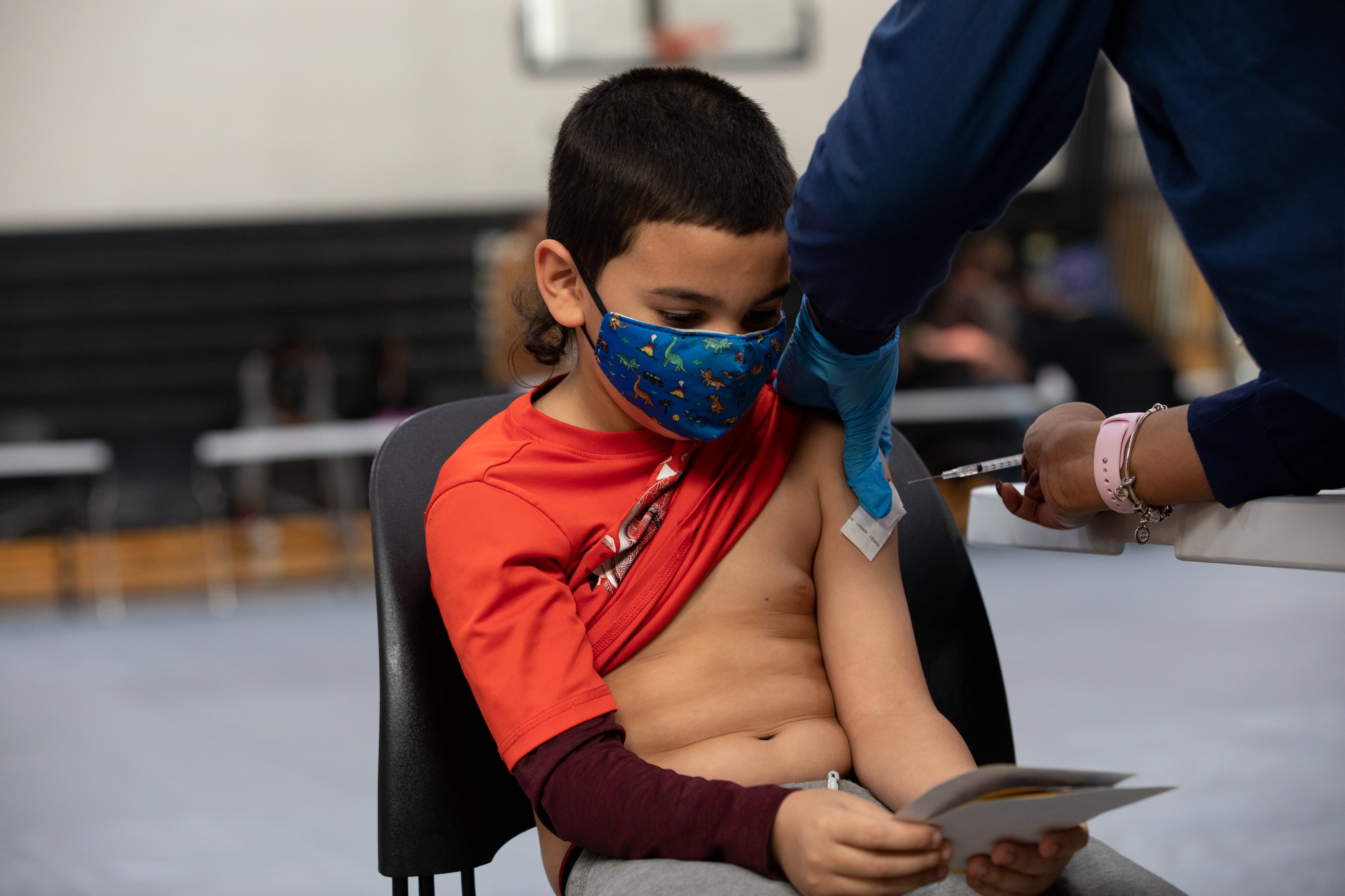Gov. Jared Polis is urging parents to get their children vaccinated and schools to ramp up testing to reduce disruptions in January from the highly transmissible omicron variant, but he gave no indication he’ll deviate from allowing school districts to set their own COVID policies.
So far, nearly 29% of Colorado children ages 5-11 have received at least one dose of the COVID vaccine, along with more than 65% of children ages 12 to 17. It’s a rate that exceeds the national average and puts Colorado on track to meet its goal of vaccinating half of young children by the end of January.
However, after an initial surge in interest, the pace of pediatric vaccinations has slowed in recent weeks.
Starting in late December, Colorado’s state health department will launch a $1 million advertising campaign aimed at parents. Spots on radio, television, streaming services, and social media platforms will promote the vaccine’s safety and efficacy in children. The state also is texting vaccine info to parents of young children and convening parent groups to provide feedback on common questions and concerns, all with the aim of getting more shots in the arms of kids.
“We think that having a higher vaccination rate for kids age 5 and up is a key part of making sure our schools safely remain in session next semester as Colorado experiences what other parts of the world and the country are already experiencing with the spread of the omicron variant,” Polis said at a press conference Tuesday.
Polis also encouraged school districts to take advantage of the state’s rapid testing program.
“Implementing testing can be a very effective way to welcome students back without welcoming COVID back to your campus after the break,” Polis said. “We would love to work with districts to provide that capacity to test kids as they return to minimize any disruption to in-person education.”
The state’s federally funded $173 million testing program for schools has faced a bumpy rollout, with fewer school districts participating than the state had hoped and some participating schools reporting problems with vendors and logistical challenges, as well as low participation.
Families can also request free rapid tests directly from the state, and the Biden administration plans to set up a similar system starting in January.
Schools in the northeast that are still in session this week amid a surge in COVID cases connected to the omicron variant are already reporting serious disruptions. More staff have called in sick, and more parents are keeping their children home. Some school districts are delaying the return from winter break and asking parents to test their children for COVID before sending them back to school.
After several weeks of steady decline, Colorado is seeing an increase in COVID cases again, with the omicron variant already making up almost half of new cases, State Epidemiologist Rachel Herlihy said. Denver and the state’s tourism-dependent mountain counties are seeing the largest increases.
Throughout a long fall surge that saw hundreds of school outbreaks, Colorado schools mostly kept students in the classroom, with some closures related to quarantines and staffing shortages.
Colorado has no statewide mask mandate for schools or businesses, and Polis has let school districts set their own policies, usually in cooperation with local public health departments, though the state provides guidance. Many school districts adopted mask requirements to reduce the number of students in quarantine after a classmate tests positive, but in recent weeks, some districts have rolled those back, while other districts never adopted mask requirements. Just a handful of districts require staff to be vaccinated.
Asked if he was reconsidering this local approach in light of how rapidly omicron can spread, Polis did not answer directly.
“We strongly support the steps our local school districts are working on with our county health departments,” he said.
Districts that responded to Chalkbeat’s inquiries — Douglas County School District, Eagle County Schools, and the Roaring Fork School District — said they are monitoring the situation but not planning any policy changes or extended holidays. Roaring Fork is maintaining its mask mandate, and Eagle County Schools will be under a local mask mandate through at least mid-January as public health officials there grapple with some of the highest case rates in the state. A new conservative school board in Douglas County recently voted to make masks optional.
Herlihy said state health officials are looking at isolation and quarantine guidance, including new federal recommendations that schools allow students who test negative after exposure to stay in class, to see if changes are warranted.
“Test-to-stay and testing strategies in schools are a critical component to keeping schools open, and we are looking to broaden our testing capacity for schools,” Herlihy said.
Public health experts, meanwhile, described winter break as a window of opportunity to increase vaccination rates among both children and adults, including for school staff to get a booster shot. About half of eligible adults have received a third dose of the COVID vaccine.
“Because schools are closed for the next couple weeks, it’s a bit of a blessing and gives us a window to prepare,” said Beth Carlton, an associate professor of environmental and occupational health at the Colorado School of Public Health and a member of the state’s COVID-19 modeling team. “It lets staff and teachers prepare and make sure they are up-to-date and boosted and that more parents can get their children vaccinated.”
Officials are closely watching what is happening in other states. Herlihy and Carlton said it’s still not clear how sick omicron makes people and whether different age groups might be affected differently than with previous strains of the virus. One study in South Africa found an increased risk of hospitalization for children even as adults were more protected, but it was too small to draw firm conclusions, Herlihy said.
While there seem to be more breakthrough cases with omicron, Carlton said vaccines continue to be very effective at preventing serious illness and make it less likely people will give the disease to others.
All the mitigation measures that have limited spread in previous stages of the pandemic remain important, Carlton said. Those include masks, improved ventilation, and regular testing.
“I’ve been hopeful that my first-grader could go to school at some point this year without a mask, but right now is not the time to relax mitigation measures,” she said.
Chalkbeat senior reporter Melanie Asmar contributed to this report.





